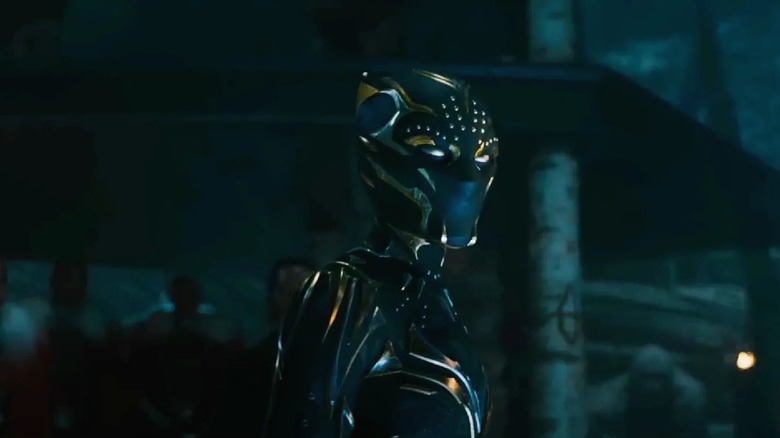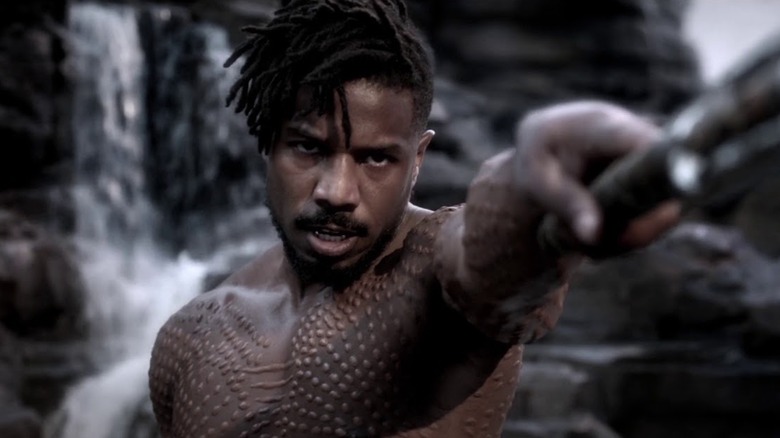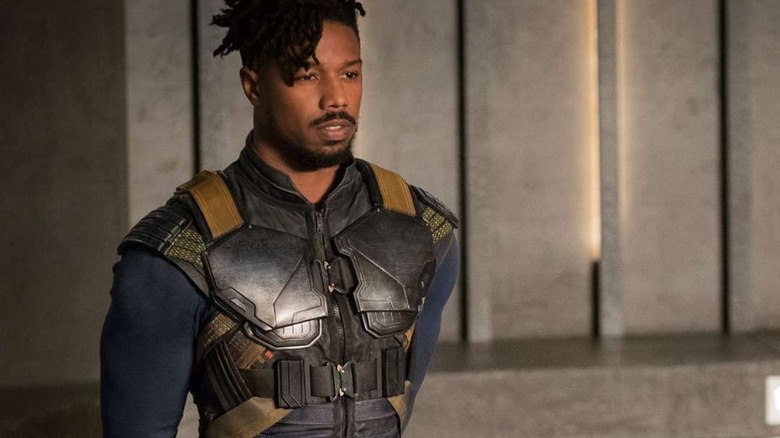The Most Brilliant Moment In Black Panther: Wakanda Forever Comes Via A Surprise Character
Warning: The post contains spoilers for "Black Panther: Wakanda Forever"
Ryan Coolger's 2018 "Black Panther" is one of the better films to have been made in the Marvel Cinematic Universe. Eschewing many of the more traditional good-guy-vs.-bad-guy trappings of the superhero genre, "Black Panther" pitted its title hero against a rival with a legitimate grievance. In the film, Black Panther, AKA King T'Challa (Chadwick Boseman) was determined to keep his country, Wakanda, secret from the world. Wakanda was located on top of the world's only known source of the miracle metal vibranium, and access to it made the country a futuristic sci-fi utopian wonderland. Fearing colonization, however, the country had long been hidden under a high-tech force field. The Black Panther was a mantle passed through the country's royal line, and each Panther protected Wakanda from any would-be colonizers that sought its technical secrets.
The villain of the film was N'Jadaka, a.k.a. Erik Stevens (Michael B. Jordan), who was a potential heir to the Wakandan throne, and who had seen enough of the outside world to know that T'Challa was not living in utopia, but hoarding Wakanda's power. Nicknamed Killmonger, N'Jadaka took the throne and set about a global revenge campaign against the generations of colonialists who have been oppressing other nations for centuries. Where was Wakanda, Killmonger asks T'Challa, during some of history's most grievous injustices?
Killmonger sought violence, but only because his operational, governmental ethos so differed from that of T'Challa's. He was a man of action, not of ritual. A man who had long ago assumed a Spider-Man ethic. If a nation has the ability to stop evil, then, by gum, he's going to do so. What was more important? Tradition and nobility and ritual? Or knuckling under and making actual dramatic change?
Killmonger's philosophy
Coogler's sequel, "Black Panther: Wakanda Forever," now out in theaters, sees the return of Killmonger, albeit in a psychic vision. In order to become a Black Panther, the selected heir must consume a rare, vibranium-infused flower and absorb its power. The flower gives its consumer superhuman strength and agility, but also induces a brief state of catatonia wherein one has a series of spiritual visions.
In "Wakanda Forever," the brilliant scientist Shuri (Letitia Wright) finds a way to recreate the flower in question — it was thought to have been killed off in "Black Panther" — and mix a new batch of hallucinatory liquid. Willing to become the next Black Panther, Shuri takes a dose and does indeed have a spiritual vision. However, as Shuri doesn't believe in the afterlife, she is not confronted with a placid, noble vision of her ancestors, but a vision of Killmonger.
Shuri, it should be stated, is filled with rage over the death of T'Challa, taken by an unnamed disease between movies. Wakanda is currently under threat of invasion by a heretofore unknown undersea kingdom of merpeople, and her mother Ramonda (Angela Bassett) has been drowned in a recent attack. She's determined to gather more strength to protect her nation. In short, she is at her wit's end. Although Shuri hated Killmonger for his actions in "Black Panther," in her vision, he begins to make a lot of good points again. He finally put it to Shuri: would she rather be meaninglessly noble like her dead brother, or would she rather get the job done?
The ethics of war
Shuri, of course, would rather get the job done. Shuri, in not believing in the spiritual aspect of the Wakandan practice, would have to look at her conversation with Killmonger as a hallucination, something conjured from her own mind. This would dictate that anything Killmonger said to her was an opinion she already, on some level, espoused. When Killmonger made a few good points, she really was convincing herself. Killmonger, she seemed to believe, was right all along.
Shuri ended up sitting bolt upright out of her reverie, embarrassed that her experience wasn't the beatific contemplation others assumed it would be. Shuri does not become a villain in that moment, but she does understand that a man she thought had been a villain had been serving as her philosophical guide. It was by blending the righteousness of her brother and the ambition and action of Killmonger that Shuri was able to grow and become a hero herself.
Contrary to most morally absolute philosophies of superhero movies (i.e., good guys are good and bad guys are bad) Shuri's Black Panther grew when she realized that her morals incorporated ideas that could be construed as good or bad depending on the context. She required the tech and the determination of T'Challa, but the willingness to take action from Killmonger.
Shuri charged into the finale of "Wakanda Forever" with a new crew, new tech, and a modern sensibility. She was able to, in ways that T'Challa and Ramonda didn't previously consider, bring Wakanda into its new modern age. An age that reflects on her willingness to take action, but also her empathy for other oppressed nations. She is, in a way, the best of both.


